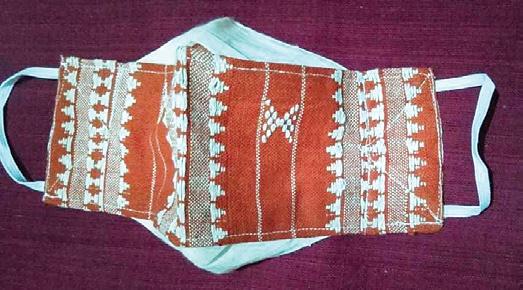Hit Hard By COVID-19, Odisha Tribals Take To Making Masks For A Livelihood

Jeypore: High demand for traditional weave masks has come to the rescue of tribal weavers of Southern Odisha’s Koraput district hit by the decline in sales of sarees woven by the community amid the COVID-induced lockdown.
The pandemic has adversely affected the livelihood of tribal communities. The lack of a steady source of income has led tribal artisans from several communities to make COVID masks. Their traditional handlooms and designs have proven to be very popular.
The Kotpad Weaving Cooperative’s timely innovation has helped their livelihood. There are myriad types of masks, owing to the ethnically diverse culture of Kotpad town.
Dongria Kodh tribals use tribal motifs on woven cloth, while Santhals use Santhali alphabets to create beautiful masks. Masks by Gonds, Kulis, Oram, Bhottada and Dharua tribes were also a big hit with people.
The face masks made by the Dongria women of Raygada district are the most popular. The masks are famed for their intricate handwork, selling for around Rs 300 to Rs 350 each, according to a report in the New Indian Express.
The initiative to switch to the production of face masks was started by the Tribal Development Cooperative Corporation (TDCC). Since May, about 2000 masks have been sold at Adisha, the brand name for these products.
There are masks made of traditional Mirigani handloom, of Kotpad town in Koraput, which are woven by the tribal weavers of Mirigan community. They use plant extracts to dye their products. Mirigani handloom received national attention after master weaver Gobardhan Panika was conferred the Padma Shri in 2018.
The Miriganis, a subset of the Dombs, have three sub-sects – Kobbiria, Vodillia and Andiniya. Their handloom making process is labour intensive and runs for eight months in a year. According to textile experts, organic dye follows sustainable and eco-friendly practices.
Sale of Mirigani handloom products, especially sarees, witnessed a sharp decline due to the lockdown. A few weavers, led by Chabi Mohanta, started making masks out of the handloom, according to another report in the New Indian Express.
Initially, 800 Mirigani masks were distributed free of cost in the locality, the paper stated. With the increase in popularity, around 8,000 masks have been sold in New Delhi, Bengaluru, Bhubaneswar and Kolkata in the last two months.
The masks cost between Rs 40 and Rs 150, depending on the design. Chabi said to the paper that traders from within and outside the state are now placing bulk orders for the masks, but it is not possible for the weavers to meet the demand.
“We have decided to procure six more sewing machines and engage more weavers to meet the demand,” he said.

Comments are closed.